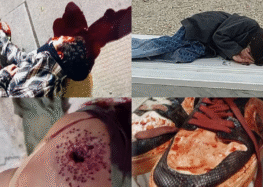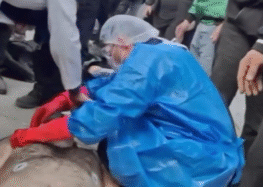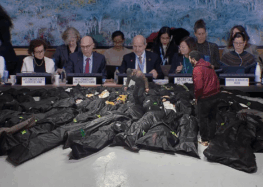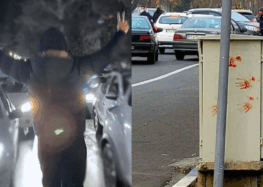Astonishment at Kahrizak Ruling: Mortazavi Sentenced to $60 Fine and Five Years’ Dismissal From Government Jobs
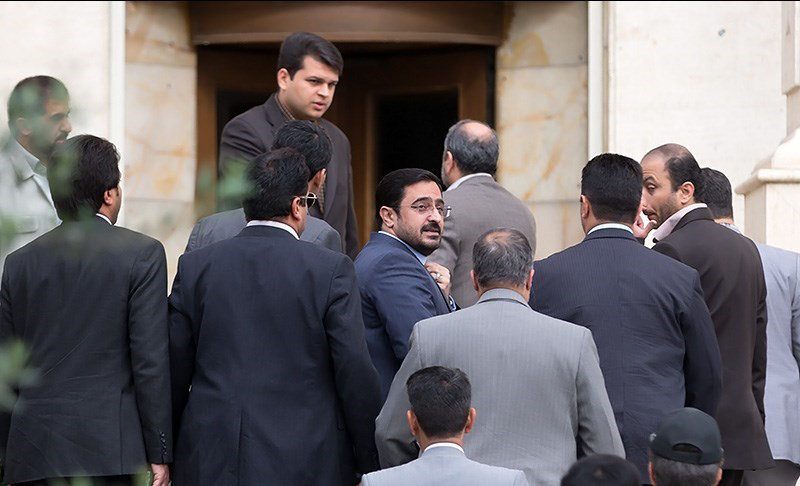
Mohammad Saleh Nikbakht, the lawyer representing Amir Javadifar’s family, one of the plaintiffs in the case, previously told Fars News Agency that Saeed Mortazavi’s 38-hour delay in transferring the Kahrizak detainees to another location had caused the three deaths. Referring to statements made by seven prominent physicians from the Medical Examiner Office, Nikbakht told Fars that the three men died as a result of “blows to their soft tissue during the 72 hours prior to their deaths.” Photo shows Saeed Mortazavi entering the court.
A lower court ruling in the Kahrizak case issued yesterday indicates that the three suspects in the case were permanently dismissed from judicial positions, and further dismissed from government employment for five years. To the astonishment of observers, Saeed Mortazavi, the prime suspect in the case, was acquitted from the charge of “participation in murder,” and sentenced to approximately $60 in fines for “false reporting.”
The Kahrizak court ruling was issued without any of the plaintiffs’ witnesses ever being called to testify during the 11 sessions of the court, and the entire proceeding was held behind closed doors, concealing all details from public knowledge. Even when the semi-official Mehr News Agency published the court rulings yesterday, July 2, the news item was removed from the news agency’s website after a few hours. Some sources have reported that news was removed due to pressure by Tehran Prosecutor and that newspapers have been warned not to publish news about Mortazavi’s sentencing. The International Campaign for Human Rights in Iran has not been able to independently confirm this news.
Though plaintiffs in the case have maintained silence or have made very short statements about the case, Mohammad Aslani, the lawyer representing Saeed Mortazavi, told ISNA that he and his client have not yet seen the ruling, but that they will appeal it. “We will appeal whatever sentence my client has received,” Aslani told ISNA.
During his Monday, July 1 press conference, the Judiciary spokesperson Mohseni Ejei referred to the lower court ruling in the Kahrizak case, saying that the defendants will have 20 days in which to appeal the court ruling, but did not provide any details about the ruling. One day later, on July 2, after Mehr News Agency published details of the lower court ruling, Mohsen Eftekhari, Head of the Tehran Penal Court, objected. In an interview with Fars News Agency, the Judiciary official said that announcing details of the lower court ruling was “illegal,” and that “the medium that published this news must be legally accountable.” Following these reactions, Mehr News Agency removed the news article containing the ruling details from its website.
A few hours after news about the ruling was released, Mir Majid Taheri, the lawyer representing the family of Mohsen Rooholamini, one of the men who died at Kahrizak, told ISNA, “the issued ruling in the case of Kahrizak judges is in favor of my client.”
Asked whether his client intends to object to the lower court’s ruling, Taheri said,”as the ruling was issued in our favor, the issue of an objection is irrelevant. Of course, the judge and the court have control over the level of punishment and we cannot determine the punishment level.”
In the report Mehr News Agency published, Saeed Mortazavi was acquitted of the charge of “participation in murder” by “majority vote of judges.” Saeed Mortazavi was the Tehran Prosecutor at the time of Kahrizak events and he was the prime suspect in the case, charged with participation in the murder of Mohammad Kamrani, 18, who died under torture at Kahrizak.
Following the release of information about the Kahrizak ruling, there has been widespread objection on social networks such as Facebook and Twitter about the disproportionate punishment for the suspects’ charges. During Saeed Mortazavi’s term as a judge and a prosecutor, many individuals were sentenced to years of imprisonment for writing articles or for participating in post-election demonstrations. Many of these individuals are currently in prison, having been denied a fair judicial process.
The Kahrizak trial is related to the murders of three young men, Mohammad Kamrani, Mohsen Rooholamini, and Amir Javadifar, inside the Kahrizak Detention Center in 2009. According to the indictment issued by the Prosecutor, Saeed Mortazavi was charged with “participation in murder,” “participation in illegal detention,” and “participation in creating untrue reports through ordering or encouraging the related officers to write reports to himself,” and Zare Dehnavi and Heydarifar were charged with “participation in illegal detentions.” The trial was held in 11 sessions at the Tehran Penal Court’s Branch 76 under Judge Siamak Modir Khorasani.
The top defendant in the case, Saeed Mortazavi, did not accept any of his charges and stated that he and the other suspects had not committed any wrongdoing, and that there was not one shred of evidence for their charges. At the third court session, however, Judge Ali Akbar Heydarifar claimed guilt and responsibility for everything, saying he had ordered the transfer of the detainees to Kahrizak Prison in the summer of 2009.
Following the disputed presidential elections of 2009, dozens of protesters arrested by security forces were transferred to Kahrizak, a horrific detention center in southern Tehran. According to accounts provided by many individuals released from Kahrizak, they were exposed to psychological and physical torture and sexual abuse at the facility.
Mehdi Karroubi, a presidential candidate in 2009, asked Members of the Parliament to pursue allegations of rape inside the Kahrizak Detention Center in 2009. After an initial flurry of reports, the subject was dropped and the individuals responsible for finding facts about the situation were imprisoned. The mistreatment and torture of detained protesters inside Kahrizak led to the deaths of at least three young men, Mohammad Kamrani, Mohsen Rooholamini, and Amir Javadifar. The families of the three victims insisted that the “judicial official who issued the orders that led to the set of events” be put on trial, and more than three years after the incident the trial began in early 2013. After the media attention, the Kahrizak Detention Center was closed down in 2010.

